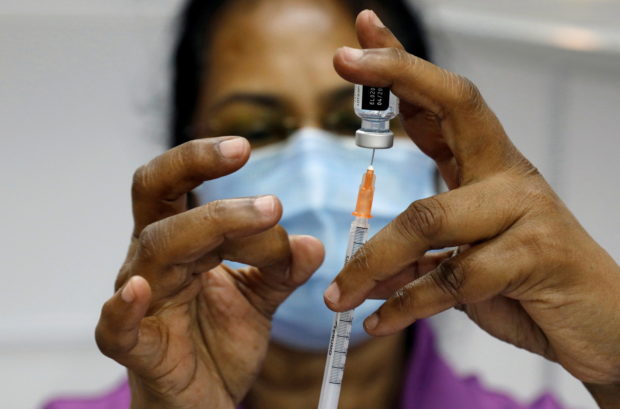Vaccinated people make up 75% of recent COVID-19 cases in Singapore, but few fall ill

A medical worker prepares a syringe at a coronavirus disease (COVID-19) vaccination center in Singapore, March 8, 2021. (REUTERS/File Photo)
SINGAPORE – Vaccinated individuals accounted for three-quarters of Singapore’s COVID-19 infections in the last four weeks, but they were not falling seriously ill, government data showed, as a rapid ramp-up in inoculations leaves fewer people unvaccinated.
While the data shows that vaccines are highly effective in preventing severe cases, it also underscores the risk that even those inoculated could be contagious, so that inoculation alone may not suffice to halt transmission.
Of Singapore’s 1,096 locally transmitted infections in the last 28 days, 484, or about 44%, were in fully vaccinated people, while 30% were partially vaccinated and just over 25% were unvaccinated, Thursday’s data showed.
While seven cases of serious illness required oxygen, and another was in critical condition in intensive care, none of the eight had been fully vaccinated, the health ministry said.
“There is continuing evidence that vaccination helps to prevent serious disease when one gets infected,” the ministry said, adding that all the fully vaccinated and infected people had shown no symptoms, or only mild ones.
Article continues after this advertisementInfections in vaccinated people do not mean vaccines are ineffective, experts said.
Article continues after this advertisement“As more and more people are vaccinated in Singapore, we will see more infections happening among vaccinated people,” Teo Yik Ying, dean of the Saw Swee Hock School of Public Health at the National University of Singapore (NUS).
“It is important to always compare it against the proportion of people who remain unvaccinated…Suppose Singapore achieves a rate of 100% fully vaccinated…then all infections will stem from the vaccinated people and none from the unvaccinated.”
Singapore has already inoculated nearly 75% of its 5.7 million people, the world’s second highest after the United Arab Emirates, a Reuters tracker shows, and half its population is fully vaccinated.
As countries with advanced vaccination campaigns prepare to live with COVID-19 as an endemic disease, their focus is turning to preventing death and serious diseases through vaccination.
But they are grappling with how to differentiate public health policies, such as mask wearing, between the vaccinated and those who are not.
Both Singapore and Israel, for example, reinstated some curbs recently to battle a surge in infections driven by the highly contagious Delta variant, while England lifted almost all restrictions this week, despite high caseloads.
“We’ve got to accept that all of us will have to have some restrictions, vaccinated or not vaccinated,” said Peter Collignon, an infectious diseases physician and microbiologist at Canberra Hospital in the Australian capital.
“It’s just the restrictions are likely to be higher for those unvaccinated than vaccinated people, but that may still mean they have mask mandates indoors, for instance.”
The Singapore data also showed that infections in the last 14 days among vaccinated people older than 61 stood at about 88%, higher than the figure of just over 70% for the younger group.
Linfa Wang, a professor at Duke-NUS Medical School, said elderly people had been shown to have weaker immune responses upon vaccination.
In Israel, which also has a high vaccination rate, about half of the 46 patients hospitalised in severe condition by early July had been vaccinated, and the majority were from risk groups, authorities said.
It was not immediately clear if the Singapore data reflected reduced protection offered by vaccines against the Delta variant, the most common form in the wealthy city state in recent months.
Two doses of vaccine from Pfizer-BioNTech or AstraZeneca are nearly as effective against Delt
a as against the previously dominant Alpha variant, according to a study published this week.
Singapore uses the Pfizer and Moderna vaccines in its national vaccination programme.
Friday’s 130 new locally-transmitted infections were off this week’s 11-month high. The recent rise in cases prompted authorities to tighten curbs on social gatherings in the push to boost vaccinations, particularly among the elderly.
For more news about the novel coronavirus click here.
What you need to know about Coronavirus.
For more information on COVID-19, call the DOH Hotline: (02) 86517800 local 1149/1150.
The Inquirer Foundation supports our healthcare frontliners and is still accepting cash donations to be deposited at Banco de Oro (BDO) current account #007960018860 or donate through PayMaya using this link.